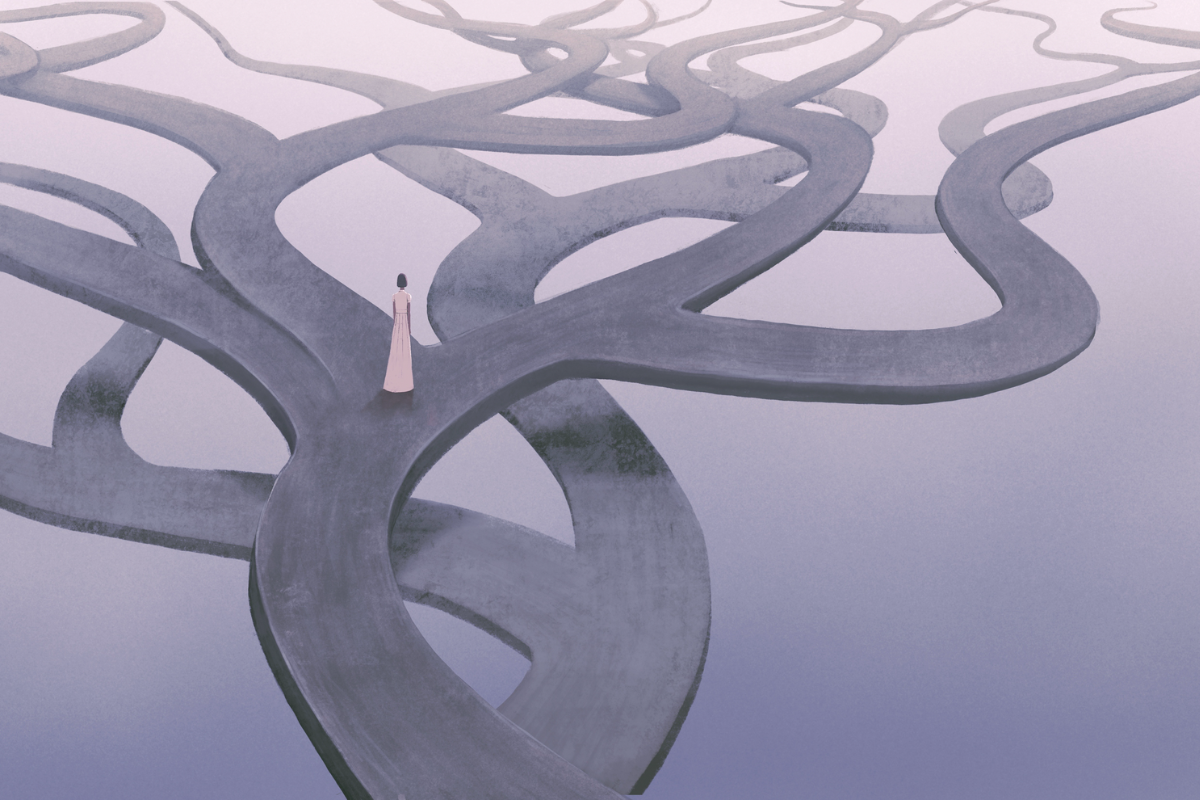From the temple bima, my 13-year-old daughter resembles her favorite childhood princess in her shimmery gold bat mitzvah dress. A bookworm and a dreamer, like Belle, she begins her speech with, “If you knew something bad was going to happen, would you want to know so you could be prepared, or not want to know?”
I believe she’s talking to me.
In reality, she’s setting the mood for her interpretation of Lech-Lecha, “Go Forth,” the Torah portion in which God tells Abram to “leave your land, your birthplace and your father’s house and go to the land I will show you.” It’s about a journey.
This event, my daughter’s rite of passage into Judaism, into becoming a woman, evokes my envy at not having had the same opportunity at her age, instead experiencing this childhood milestone as a 43-year-old mother of two with a condensed Jewish education culminating in a group adult b’nai mitzvah a year ago. Had I had this experience at my daughter’s age, along with my middle school friends, would the trajectory of my life have been different? Would the answers to the questions I’m asking in my 40s have been revealed as a teenager?
Her opening question also pricks at the secret I’ve been keeping, the one that has ushered me into my own journey. One I never saw coming. But my daughter senses something is coming and answers her own query, saying, “I would want to know.”
Like Abram and my daughter, I’m on the precipice of a new chapter in my life. I am embarking on an inner sojourn to the root of my soul, to discover my true essence. Paralleling my adolescent daughter’s age-appropriate transition between childhood and adulthood, my exploration is late in coming and will steer me away from the only path I’ve ever known, the one that I envisioned and successfully created. The one I now worry will be blown up by the late-in-life discovery of my same-sex attraction.
At 75 years old, Abram hears the call from God to leave the familiar, his only home, and set forth on an adventure with the promise of great things to come. He takes his closest family, some possessions and help. A support system.
At 44 years old, my calling came from deep within after meeting a woman at work who awakened feelings in me I hadn’t known were there. The pull to cross a threshold, to understand these emotions, felt urgent and taunted me with regret if I didn’t heed the call. Abram and I are late bloomers.
Unlike the Genesis patriarch, I didn’t have a support system; I needed to create one. Reaching out to strangers, I found it in the Jewish community: a Village People assortment that included a young rabbinic intern, a former member of the Hasidic community, a Modern Orthodox woman, a cantor, a Buddhist practicing Jewish therapist and a monthly support group held in a Manhattan JCC. My earliest support network guided me through my existential crisis while I simultaneously performed my usual roles of wife, mother, daughter and occupational therapist — all while planning my daughter’s bat mitzvah celebration.
Threads of familiarity were woven into the construction of a new life. Speaking with people who shared my inherited faith provided comfort. The LGBTQ-friendly synagogue I attended used the same siddur as my family’s temple, while the large rainbow flag behind the makeshift bima reminded me of the new direction my life was going.
Transformations are common throughout all our lives. We outgrow childhood nicknames or choose to take on our spouse’s name. A new degree changes our title, and the addition of children adds to our roles — making us mom, dad, aunt, uncle, godparent, grandma, grandpa. For those of us whose spiritual journey takes us deep inside ourselves, the shift is less obvious to the outside world, a private reckoning. My own was an evolution, a change in the sexual orientation with which I always identified, leading to other significant changes including the end of my 19-year marriage to a man.
In Lech-Lecha, Abram and his wife, Sarai, change several times. They relocate to another country and become Abraham and Sarah, respectively. As my daughter’s opening question in the sanctuary does, we challenge ourselves before embarking on a journey that will lead us to a better understanding, to a truer self.
I know that my daughter’s bat mitzvah, the culmination of a Jewish education that had her engaged in studies with rabbis, cantors, teachers and peers, marks not the end of her Jewish journey, but merely the beginning of a lifelong exploration of her identity as a Jewish woman. Just as my journey marks the beginning of my exploration of a new identity and how to navigate all my responsibilities with it.
We’re all on a journey, searching, trying to find meaning and make sense of the world within us and around us. We go forth, or go within, typically without the fanfare of a b’nai mitzvah — without the party, without the chair lift — but with subtle transitions that become the guideposts of our life’s journey. Embodying the ruach, the spirit, the essence of our true self, we move along many spiritual quests in an endeavor to live authentically.








